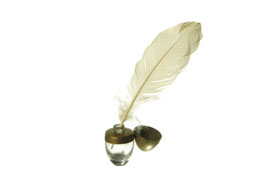
March 27, 2014

Source: Shutterstock
In his column the other day, Pat Buchanan quoted the last lines of Robert Southey’s poem ‘The Battle of Blenheim”:
“But what good came of it at last?”
Quoth little Peterkin.
“Why that I cannot tell,” said he,
“But “t was a famous victory!”
That sent me off looking for the poem, and I knew where to look. No, not the Internet. The Internet’s a fine thing in many ways, to be sure, but poetry belongs in books.
The actual book Southey’s poem belongs in is Michael Turner’s 1967 Parlour Poetry: A Hundred and One Improving Gems, an enduring classic of its own small kind. Friends in England gave me a copy in”I see from the inscription”1989, and it’s been with me ever since.
Turner’s idea was to gather together poems that late-Victorian children would have committed to memory and recited at family gatherings or school concerts: “Poems””I”m quoting from his preface””of the highest moral rectitude…with plain, easy rhythms, uncomplicated heroics, and unabashed pathos.”
He says that the tradition of family reciting in the actual parlor”the living room”of middle-class homes died out with the coming of radio in the 1920s, but recitation lingered on in the educational system. It certainly did: I learned to recite some of these poems”Byron’s “Sennacherib,” Browning’s “How They Brought the Good News“”in my own 1950s school days.
Fragments of others survived back then in the speech of older people, usually uttered facetiously. Coming into my room and finding it a mess, my mother would say, “It’s like the wreck of the Hesperus in here!” Or if I whined about having lost something, she would tell me cheerfully: “Not lost, but gone before.” (I didn’t see that in print until getting Turner’s book.)
Longfellow’s not an anomaly in a British verse anthology, by the way. Victorian Britain was very hospitable to American poetry. Visiting London in 1868, Longfellow copped an audience with Queen Victoria herself, a huge fan. Turner reflects all this with poems from Whittier, Poe, and Bryant, as well as lesser American lights such as Samuel Woodworth and James Whitcomb Riley, “the Hoosier Homer.”
And in his footnote to Sir Henry Newbolt’s “Vitaï Lampada“ (“Play up! play up! and play the game!”) Turner pays a tribute to the US equivalent, Grantland Rice’s “Alumnus Football“:
For when the One Great Scorer comes
To write against your name,
He marks”not that you won or lost”
But HOW you played the Game.
Turner’s footnotes are little gems in themselves, garnished with the lightest kind of dry wit.
The biographical note on Southey, for example, concludes with this sentence: “At his death which followed shortly after [his second marriage], he left the considerable sum of £12,000, a figure that no Victorian biographer fails to note with approval.”
The footnote on Sir Francis Doyle, who wrote “The Private of the Buffs,” includes this sentence without further comment: “He went to Eton and Oxford, where, the Dictionary of National Biography reports, ‘his intercourse with Gladstone became very intimate”.”
And so on.
Some of the other poems here survived in mid-20th-century English schoolyards as parody:
The boy stood on the burning deck,
Picking his nose like mad;
Rolling snot into little balls
And flicking them at his Dad.
Or:
Laugh, and the world laughs with you;
Snore, and you sleep alone…
Lewis Carroll, a master of parody, spoofed some of these gems in the Alice books. The “Philadelphia bard” David Bates wrote:
Speak gently!—It is better far
To rule by love, than fear…
This became Carrollized to:
Speak roughly to your little boy,
And beat him when he sneezes….